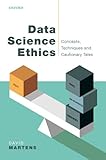Data science ethics : concepts, techniques and cautionary tales / David Martens.
Material type: TextPublication details: Oxford : Oxford university press, c2022Description: xii, 255 pages : illustrations (some color), color map ; 24 cmISBN:
TextPublication details: Oxford : Oxford university press, c2022Description: xii, 255 pages : illustrations (some color), color map ; 24 cmISBN: - 0192847260
- 9780192847263
- 0192847279
- 9780192847270
- 005.7 23
- QA76.9.B45 .M36 2022
| Item type | Current library | Collection | Call number | Copy number | Status | Date due | Barcode | |
|---|---|---|---|---|---|---|---|---|
 Books
Books
|
Zetech Library - TRC General Stacks | Non-fiction | QA76.9 .B45 .M36 2022 (Browse shelf(Opens below)) | C2 | Available | Z012281 | ||
 Books
Books
|
Zetech Library - TRC General Stacks | Non-fiction | QA76.9 .B45 .M36 2022 (Browse shelf(Opens below)) | C1 | Available | Z012280 |
Browsing Zetech Library - TRC shelves, Shelving location: General Stacks, Collection: Non-fiction Close shelf browser (Hides shelf browser)

|

|

|

|

|

|

|
||
| QA76.9.B45 .B49 2021 Big data analytics for Internet of things | QA 76.9.B45 .H395 2021 Data ethics of power: a human approach in the big data and AI era / | QA 76.9.B45 .H395 2021 Data ethics of power: a human approach in the big data and AI era / | QA76.9 .B45 .M36 2022 Data science ethics : concepts, techniques and cautionary tales / | QA76.9 .B45 .M36 2022 Data science ethics : concepts, techniques and cautionary tales / | QA76.9 B53 2007 Systems analysis and design for the global entreprise/ | QA76.9 B53 2007 Systems analysis and design for the global entreprise/ |
Includes bibliographical references and index.
Introduction to data science ethics -- Ethical data gathering -- Ethical data preprocessing -- Ethical modelling -- Ethical evaluation -- Ethical deployment
Data science ethics is all about what is right and wrong when conducting data science. Data science has so far been primarily used for positive outcomes for businesses and society. However, just as with any technology, data science has also come with some negative consequences: an increase of privacy invasion, data-driven discrimination against sensitive groups, and decision making by complex models without explanations. While data scientists and business managers are not inherently unethical, they are not trained to weigh the ethical considerations that come from their work - Data Science Ethics addresses this increasingly significant gap and highlights different concepts and techniques that aid understanding, ranging from k-anonymity and differential privacy to homomorphic encryption and zero-knowledge proofs to address privacy concerns, techniques to remove discrimination against sensitive groups, and various explainable AI techniques. Real-life cautionary tales further illustrate the importance and potential impact of data science ethics, including tales of racist bots, search censoring, government backdoors, and face recognition. The book is punctuated with structured exercises that provide hypothetical scenarios and ethical dilemmas for reflection that teach readers how to balance the ethical concerns and the utility of data. --
There are no comments on this title.

